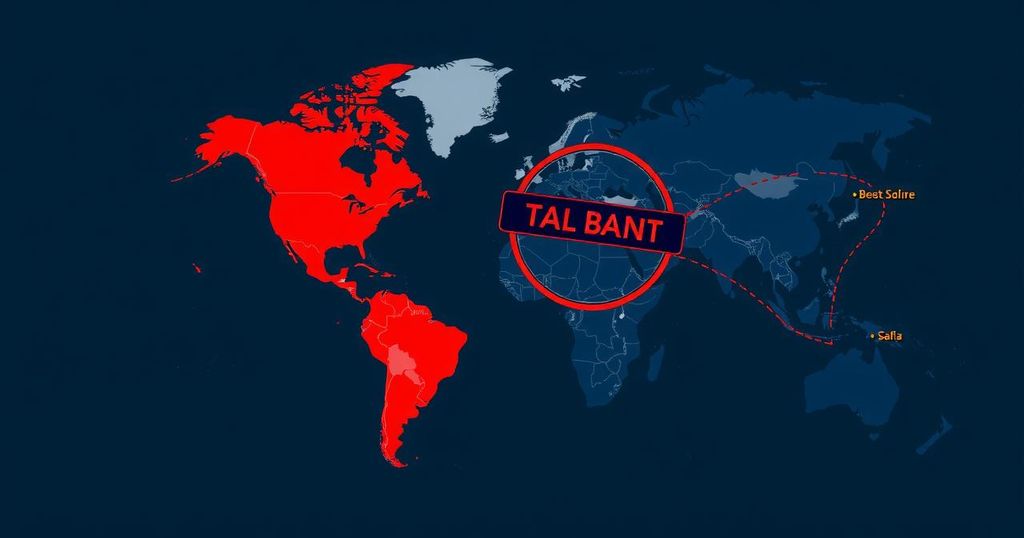World news
AFRICA, CUBA, DONALD TRUMP, JOE BIDEN, MYANMAR, NATIONAL SECURITY, NBC NEWS, NORTH AMERICA, POLITICS, SIERRA LEONE, SOUTH AMERICA, STATE DEPARTMENT, SUDAN, TRUMP, TRUMP ADMINISTRATION, TRUTH SOCIAL, U. S, U. S. STATE DEPARTMENT, U.S. ELECTIONS, US PRESIDENTIAL ELECTION, VENEZUELA
Fatima Khan
0 Comments
Trump Issues New Travel Ban Affecting Nearly 20 Countries: What Travelers Need to Know
President Donald Trump has announced a travel ban affecting nearly 20 nations, citing national security. The ban restricts entry for nationals from countries such as Afghanistan, Iran, and Libya, while implementing partial measures for several others. Travelers are expected to check in with relevant authorities, as the ban begins on June 9, 2025.
In a major announcement, President Donald Trump signed a new travel proclamation on Wednesday aimed at nearly 20 countries, largely due to national security concerns. This sweeping ban bars entry to the United States for foreign nationals from countries like Afghanistan, Iran, Haiti, and Libya, while also imposing partial restrictions on nationals from Burundi and Venezuela, among others. The new measures come as the Trump administration underscores the importance of screening and vetting, carefully targeting nations considered to have “high visa overstay rates.”
This travel ban appears reminiscent of Trump’s 2017 action that many label as the “Muslim ban,” which faced significant backlash and legal challenges. It’s worth noting that during Joe Biden’s presidency, he repealed the previous restrictions back in 2021, deeming them “a stain on our national conscience.” Interestingly, this latest proclamation allows for exceptions: lawful residents and certain visa holders may still enter, although the specifics of those qualifications remain vague.
So, what does this mean for international travelers? The implications are significant—especially for tourists, students, and applicants waiting for work visas from the impacted nations. Those already residing in the U.S. and looking to renew their visas may encounter hurdles upon reentry. It’s all part of Trump’s pledge for his 2024 campaign, coming shortly after an antisemitic incident in Colorado, which he cited as a reason for tighter border security.
Travelers from affected regions are also strongly advised to check in with the U.S. State Department or consult an immigration attorney for the most updated advice, particularly if they have connections to these banned nations. The complete restrictions apply to nationals of 12 countries: Afghanistan, Burma (Myanmar), Chad, the Republic of the Congo, Eritrea, and others, while partial restrictions affect nationals from countries like Cuba and Laos.
The travel ban is set to go into effect at 12:01 a.m. ET on Monday, June 9, 2025. As the date approaches, travelers from these nations may find themselves in uncertain waters. Those from fully banned countries could be outright denied boarding by airlines or face rejection at U.S. airports. Meanwhile, individuals from partially restricted countries may encounter inconsistencies and additional vetting upon arrival.
Travelers who have already purchased tickets must consult with their airlines or their nearest U.S. embassy for guidance on their status. While exceptions do exist, the expectation remains that entries from fully banned countries will largely be denied, whereas those with tickets from partially restricted nations might find a path forward, albeit with extra requirements.
In light of the new policy, ongoing monitoring of the situation through official State Department channels and thorough legal counsel is essential for anyone affected by this latest travel ban.
In summary, President Trump’s latest travel ban imposes significant restrictions on nearly 20 countries, citing national security as the primary concern. This ban draws on elements of past controversial policies, and while exceptions exist, many travelers may face challenges. With the start date set for June 9, 2025, those affected should urgently seek the latest information and be aware of potential impacts on their travel plans and visa processes.
Original Source: www.usatoday.com




Post Comment